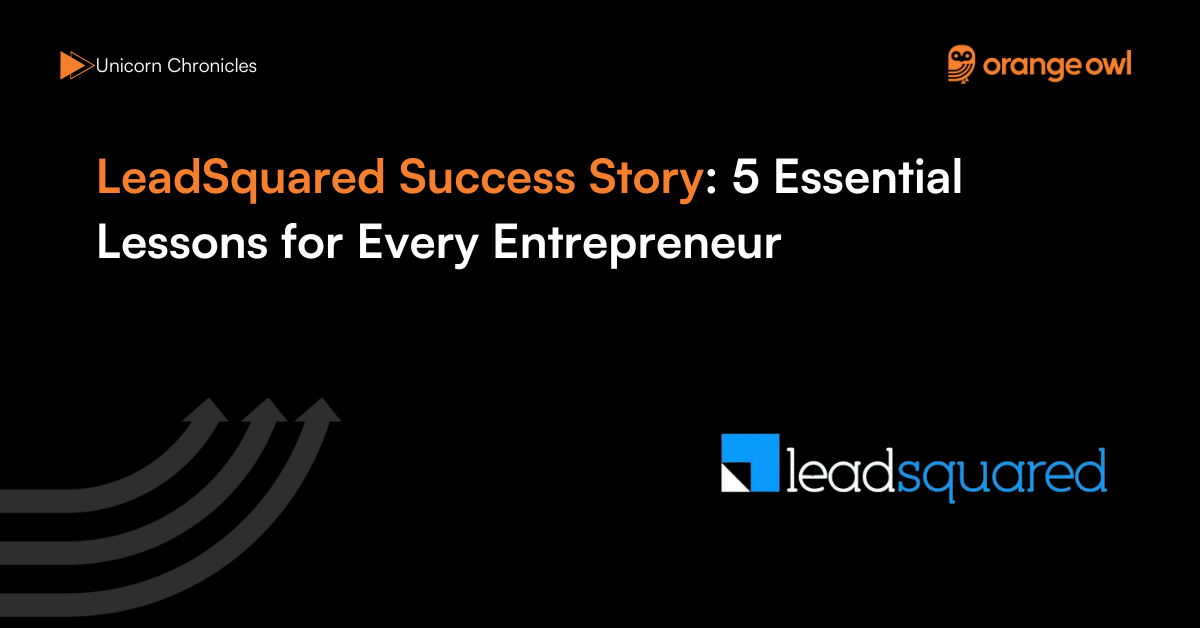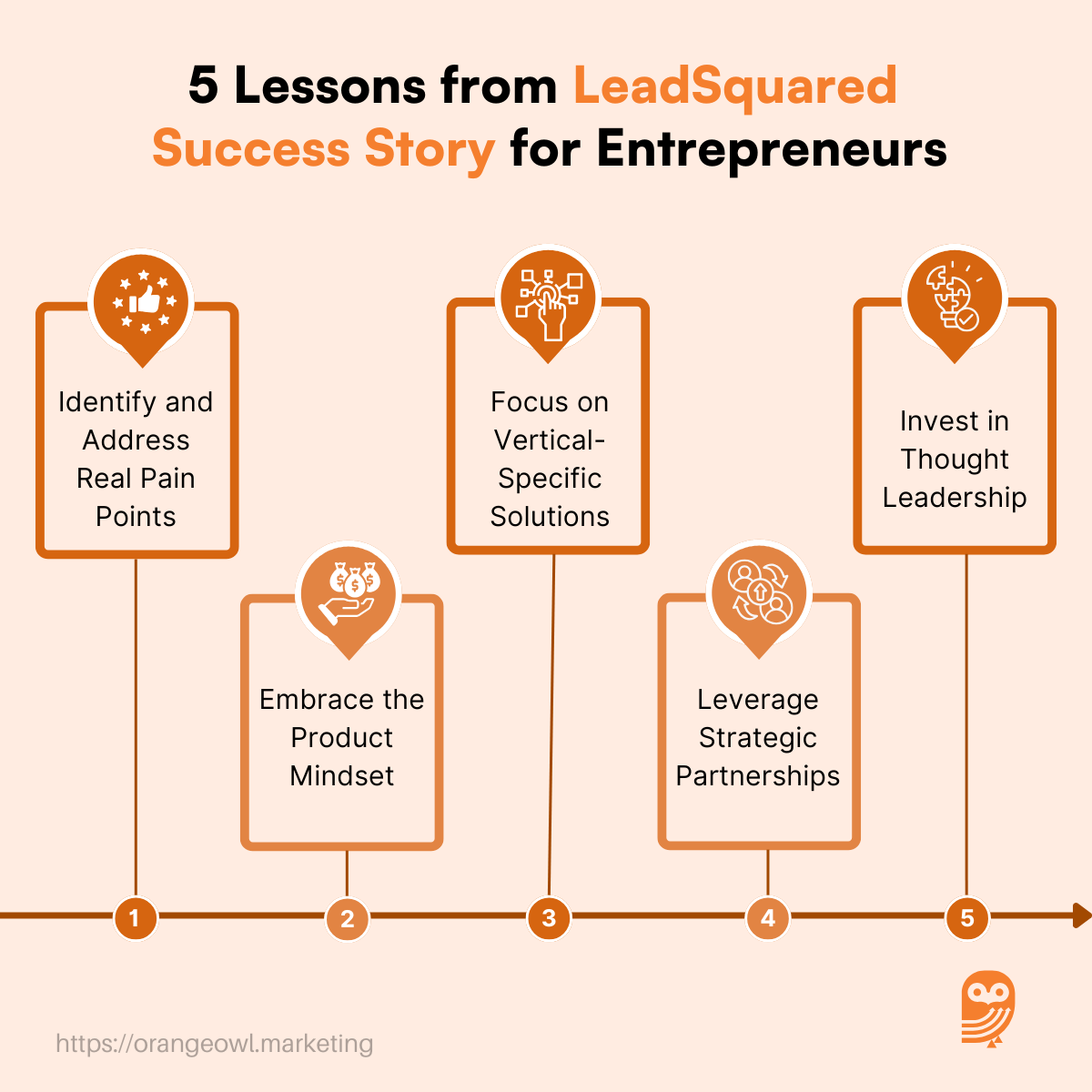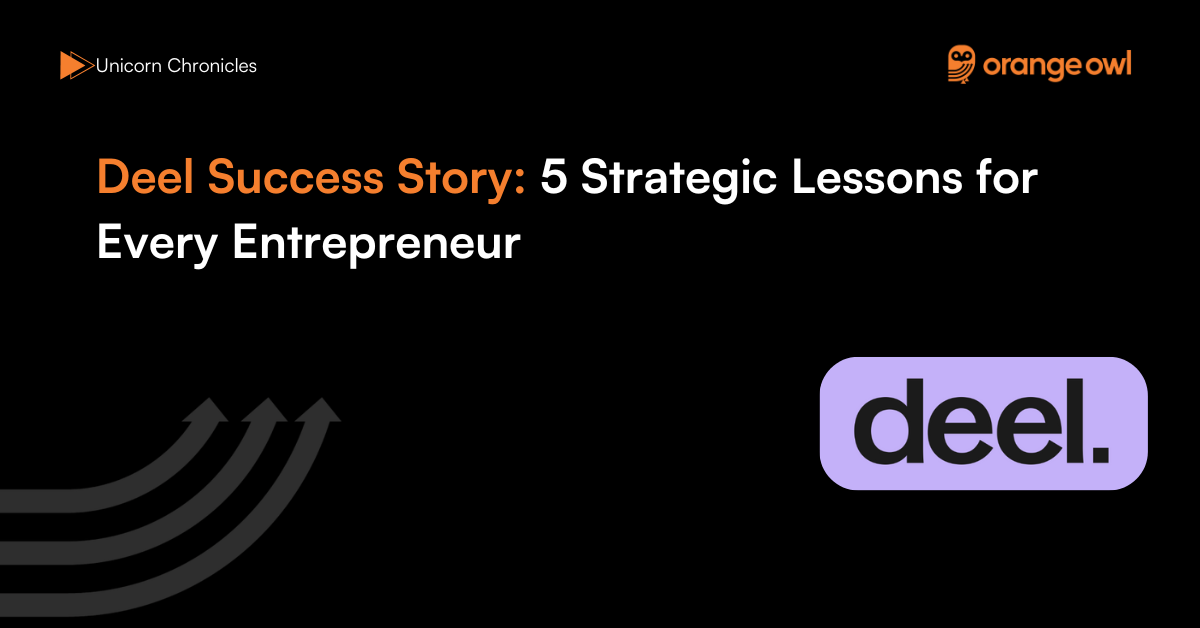LeadSquared Success Story: 5 Essential Lessons for Every Entrepreneur
Vivek Goel
April 29, 2025

Table of Contents
Introduction
In the fast-evolving landscape of SaaS (Software as a Service), few companies have navigated growth and scale as successfully as LeadSquared. What started as a small, bootstrapped venture in Bengaluru in 2011 has now transformed into a global leader in sales automation and CRM solutions. The company was co-founded by Nilesh Patel, Prashant Singh, and Sudhakar Gorti—three experienced professionals who previously built and sold a successful software services firm and decided to solve a challenge they had witnessed firsthand: the inefficiencies in managing sales and marketing operations at scale.
LeadSquared was envisioned as a unified platform that could bring order to the chaotic processes businesses were using to capture leads, track prospects, and convert them into customers. Rather than relying on multiple disjointed tools, LeadSquared promised seamless automation across the entire customer journey. This powerful value proposition struck a chord especially with industries such as education, financial services, healthcare, and real estate, where high-velocity lead management and customer engagement are critical for growth.
Over the years, the company has grown to serve more than 2,000 businesses in over 40 countries, offering them robust solutions that support inside sales, field sales, marketing automation, and onboarding workflows. In 2022, LeadSquared achieved unicorn status after raising $153 million in a Series C round led by WestBridge Capital, valuing the company at over $1 billion—a significant milestone that marked its arrival on the global SaaS map.
“We started with an idea that we would build a software-first business.” – Nilesh Patel
LeadSquared’s success is rooted in its commitment to product innovation, customer-centric problem-solving, and the strategic shift from a services mindset to a product-first culture. This foundation allowed the company not only to grow sustainably but also to stand out in a crowded and competitive market, where differentiation often comes down to how well a company understands its users.
Today, LeadSquared is not just a software provider—it’s a partner in growth for organizations seeking to scale their sales operations efficiently and intelligently. Its story is one of resilience, reinvention, and relentless focus—one that offers valuable lessons to every aspiring entrepreneur.
Origin Story
The foundation of LeadSquared is deeply rooted in the entrepreneurial journey of its founders—Nilesh Patel, Prashant Singh, and Sudhakar Gorti. Before venturing into the SaaS space, the trio had successfully built Proteans Software Solutions, a software services company that focused on offshore development. Their venture earned recognition for its reliability and quality, eventually leading to its acquisition by Symphony Teleca Corporation in 2010. But for the founders, this acquisition marked not the end of a journey, but the beginning of a new one.
Having spent years in the services industry, the founders were now ready to pivot to product development—a space that offered the potential for greater scalability and innovation. During their time at Proteans, they observed a recurring pain point across clients: businesses were struggling to manage their sales and marketing functions efficiently. Companies were using multiple disconnected tools for lead generation, nurturing, engagement, and sales closure, which led to fragmented workflows, data silos, and missed opportunities.
This insight became the catalyst for their next big idea. The team envisioned a platform that would bring sales, marketing, and customer onboarding into a single cohesive ecosystem. A solution that would not only automate repetitive tasks but also empower businesses with deeper insights and faster decision-making. In 2011, they launched LeadSquared, a cloud-based SaaS platform that aimed to streamline the entire customer acquisition funnel—from capturing leads to converting them into paying customers.
“We found there was a potential opportunity to create a system that was a combination of sales and marketing tools, and offer that to the market.” – Nilesh Patel
What set LeadSquared apart early on was its founder-led product vision. With their prior experience, the team had a deep understanding of the sales lifecycle and the practical challenges faced by frontline teams. This allowed them to design a product that was robust yet intuitive, with a focus on real-world usability rather than over-engineered complexity.
Their goal wasn’t just to build another CRM—it was to redefine how businesses approach revenue operations. By combining lead management, marketing automation, and sales execution under one roof, LeadSquared positioned itself as a powerful tool for growth-stage companies looking to scale without chaos.
From its earliest days, the startup focused on creating tangible business value, particularly for sectors like education, healthcare, real estate, and financial services—industries that required high-velocity sales processes. This clarity of purpose and problem-solving mindset laid the groundwork for LeadSquared’s future as a category-defining SaaS brand.
Business Landscape and Early Challenges
When LeadSquared entered the SaaS arena in 2011, the Indian startup ecosystem was still maturing. There was widespread skepticism—especially in global markets—about whether Indian companies could build scalable, enterprise-grade software. Most Indian tech ventures were still rooted in services, and product-focused SaaS startups were rare, especially those attempting to compete with global giants.
Moreover, the CRM and sales automation space was already crowded with big-name players like Salesforce, HubSpot, and Zoho. These platforms often offered best-in-class solutions for specific functions—lead management, email marketing, customer analytics, or sales tracking. As a result, most businesses were accustomed to using a patchwork of specialized tools to manage different parts of their customer acquisition funnel.
LeadSquared’s value proposition—a unified platform that could manage everything from lead capture and scoring to campaign automation and sales execution—was initially met with hesitation. Many businesses were reluctant to switch from their familiar multi-tool setup to an all-in-one solution. Convincing them meant not only showcasing the product’s capabilities but also demonstrating how it could reduce complexity and improve ROI.
What set LeadSquared apart was its relentless customer-centricity. Instead of forcing a one-size-fits-all solution, the company focused on deeply understanding client pain points across industries like education, healthcare, financial services, and real estate. This approach enabled them to offer customizable, vertical-specific solutions—a major factor in their eventual acceptance and growth.
Another major challenge was the founders’ transition from a services mindset to a product-driven philosophy. At Proteans, they were used to building custom software based on client briefs. But product development demanded a very different discipline—scalability, user-friendliness, and continuous iteration based on user feedback rather than client specifications.
“There’s a different mindset to build a product business versus what you do in services. You just have to unlearn a few things.”– Nilesh Patel
This required the team to rethink hiring, development, and support processes, investing more in product managers, UX designers, and customer success teams. It was a steep learning curve, but one that laid the foundation for a robust, scalable SaaS platform.
Through persistence, adaptability, and a strong focus on customer outcomes, LeadSquared overcame early skepticism and began gaining momentum—turning challenges into stepping stones on its path to becoming a unicorn.
Growth Strategies
LeadSquared’s impressive rise in the SaaS ecosystem is no accident—it’s the result of sharp strategic choices and a deep understanding of its target market. From the very beginning, the company recognized that scalability and specificity would be key to long-term success in a market crowded with generic CRM tools.
One of the most significant growth decisions was the shift toward vertical-specific solutions. Rather than offering a one-size-fits-all platform, LeadSquared chose to customize its features and workflows for industries such as education, healthcare, financial services, and real estate. For example, in the education sector, the platform included features tailored to admission processes and lead nurturing for student inquiries. In healthcare, it supported patient engagement and appointment tracking.
This vertical focus gave LeadSquared a clear competitive advantage. It allowed the company to speak the language of the customer, solve industry-specific problems, and become a partner rather than just a vendor. The result? Higher customer satisfaction, reduced churn, and stronger word-of-mouth referrals within niche communities.
Another critical growth lever was the development of a robust partner ecosystem. LeadSquared collaborated with resellers, implementation specialists, and technology consultants across India and international markets. This partner network played a key role in extending the platform’s reach, especially in regions where localized expertise and support made the difference between closing a deal and losing it.
LeadSquared also leaned heavily into inside sales, a strategy that proved to be remarkably effective. Instead of building costly on-ground sales teams in every geography, the company operated from India, using digital channels, targeted outreach, and virtual demos to sell to customers worldwide. This model kept customer acquisition costs low while enabling global scalability—a playbook now emulated by other Indian SaaS firms.
“We cracked the inside sales model from India to sell to the world. That gave us an edge on efficiency.” – Nilesh Patel
In 2022, these strategies culminated in a major milestone: LeadSquared raised $153 million in a Series C round led by WestBridge Capital, pushing its valuation past the $1 billion mark. The funding was earmarked for global expansion, product innovation, and hiring, setting the stage for the next chapter of growth.With these smart moves, LeadSquared proved that customer-centric innovation, strategic partnerships, and lean operational models could fuel not just survival—but sustainable, scalable success.
Marketing Strategies
LeadSquared’s marketing success lies in its subtle yet strategic approach—one that prioritizes education, trust, and community over loud, aggressive tactics. In a space dominated by performance-driven metrics, LeadSquared doubled down on value-driven content and thought leadership to build meaningful relationships with its audience.
At the core of this strategy is a robust content marketing engine. The company consistently publishes blogs, whitepapers, eBooks, customer success stories, and how-to guides that address real-world challenges faced by sales and marketing teams. Whether it’s lead leakage in education admissions or appointment scheduling inefficiencies in healthcare, LeadSquared’s content is designed to offer practical, actionable solutions.
This not only positions the brand as a trusted advisor, but also ensures that potential clients already see value before ever speaking to a salesperson. It’s content that educates—while quietly selling.
Beyond written content, LeadSquared actively engages with industry communities through webinars, virtual conferences, and on-ground events. These platforms allow them to share insights, showcase product demos, and connect directly with decision-makers across various sectors. Their participation in sector-specific panels and events—particularly in education and fintech—has reinforced their image as specialists, not generalists.
The company also invests in SEO and inbound marketing, ensuring their content reaches the right audience at the right time. Their blogs often rank high for queries like “CRM for education” or “sales automation tools,” organically driving high-intent traffic.
Another subtle yet effective pillar of their marketing strategy is customer advocacy. LeadSquared showcases detailed case studies and video testimonials of clients who’ve improved conversion rates, streamlined workflows, and scaled operations using their platform. These real-world stories add credibility, social proof, and relatability to their messaging.
What truly differentiates LeadSquared’s marketing is its human tone and relatability—qualities often missing in B2B SaaS. Their brand voice is approachable, solution-oriented, and never bogged down by jargon. They’ve succeeded in making enterprise software feel accessible, modern, and even a little fun.
“SaaS doesn’t have to be boring. We brought personality into our brand—and it resonated.” – Nilesh Patel
In a world where B2B marketing often feels cold and transactional, LeadSquared’s content-first, community-led approach has helped it stand out as a trusted, engaging, and insightful brand—a winning strategy for long-term growth.
5 Lessons Every Entrepreneur Should Learn from LeadSquared
1. Identify and Address Real Pain Points
Every successful business starts with a real problem—and for LeadSquared, that problem was the fragmented and inefficient sales and marketing workflows faced by many organizations. Having experienced these challenges firsthand during their time at Proteans, the founders understood the need for a unified platform that could manage the entire customer journey.
Instead of chasing trends, they focused on solving a problem that was both widespread and deeply felt, especially in high-touch industries like education, healthcare, and financial services. This authenticity gave them a strong foundation and built immediate relevance with early adopters.
“We started with an idea that we would build a software-first business.” – Nilesh Patel
2. Embrace the Product Mindset
One of the biggest transitions for the LeadSquared team was shifting from a services-based mindset to a product-first philosophy. Unlike service delivery, building a scalable SaaS product requires designing for repeatability, automation, and self-service. It also demanded continuous iteration based on user feedback.
This mindset shift was not easy—but it was essential. The founders had to unlearn certain practices and embrace a culture of experimentation, agility, and product-centric thinking. The lesson here is clear: the ability to adapt and reinvent yourself is critical in the startup journey.
“There’s a different mindset to build a product business versus what you do in services.”– Nilesh Patel

3. Focus on Vertical-Specific Solutions
Rather than offering a one-size-fits-all platform, LeadSquared made a strategic decision to go deep into verticals. They customized workflows, automation tools, and integrations to fit the needs of specific industries like education, BFSI (Banking, Financial Services, and Insurance), and healthcare.
This laser focus allowed them to speak the language of their clients, solve niche problems, and build industry credibility. It also led to higher customer retention, as clients saw LeadSquared not just as a tool—but as a tailor-made solution.
4. Leverage Strategic Partnerships
Growth is not always about doing everything in-house. LeadSquared understood early on the power of partnerships. By creating a strong ecosystem of resellers, system integrators, and implementation partners, they were able to reach new markets, scale faster, and provide localized support to clients.
These partnerships didn’t just increase their distribution—they also enhanced their product’s value by enabling custom deployments and domain-specific consulting. Entrepreneurs should note: a well-built partner network can become a growth multiplier.
5. Invest in Thought Leadership
In a crowded SaaS landscape, trust and credibility are often the biggest differentiators. LeadSquared carved a unique brand position by investing in thought leadership, producing high-quality content that resonated with sales and marketing professionals.
Their blogs, case studies, whitepapers, and webinars didn’t just generate leads—they educated their audience, helped solve real problems, and established the company as a go-to authority. For entrepreneurs, this underscores the power of teaching before selling.
Conclusion: Key Takeaways from LeadSquared’s Journey
LeadSquared’s remarkable transformation from a bootstrapped startup to a global SaaS unicorn is more than just a business success story—it’s a masterclass in resilience, strategic clarity, and customer obsession.
At every stage, the founders stayed grounded in their mission: to simplify and streamline sales execution for businesses across sectors. From identifying a pressing market gap to building vertical-specific solutions, from pivoting to a product-first mindset to scaling through partnerships and thought leadership—their journey is packed with lessons for today’s entrepreneurs.
What sets LeadSquared apart is not just their technology, but their relentless focus on solving real problems and delivering tangible outcomes. They didn’t chase the spotlight—they earned it through consistency, empathy, and innovation.
For any aspiring founder, LeadSquared’s story reinforces the idea that you don’t need to start big—you just need to start with purpose, build with intent, and evolve with your customers. Success, as they’ve proven, is not a destination—it’s a mindset.


